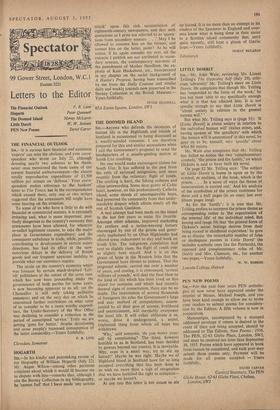LITTLE DORRIT
SIR,—Mr. John Wain, reviewing Mr. Lionel Trilling's The Opposing Self (July 29), criti- cises 'adversely' Mr. Trilling's essay on Little Dorrit. He complains that though Mr. Trilling has 'responded to the force of the work,' he has not been 'able to say 'specifically enough what it is that has affected him. It is not specific enough to say that Little Dort* is "about society in relation to the general human will."' But what Mr. Trilling says is (page 51): 'It [Little Dorrit] is about society in relation to the individual human will' (italics mine), and, having spoken of 'the specificity' with which 'the human will is anatomized' in this novel, he goes on to be, himself, very 'specific' about what he means.
Mr. Wain also complains that Mr. Trilling has failed to notice the two 'complementary symbols,' the prison and the family,' on which Dickens is said to have built his novel.
On page 52 Mr. Trilling says: 'The subject of Little Dort* is borne in noon us by the symbol, or emblem, of the book, which is the prison. . . . In a score of ways the theme of incarceration is carried out.' And his analysis of the symbolism of the prison continues for three and a half pages (in an essay just over fifteen pages long).
As for the 'family': it is true that Mr. Trilling prefers to interpret the prison theme as corresponding rather to 'the organization of the internal life' of the individual mind. But having said (page 59) that 'the general force of Dickens's social feelings derives from their being rooted in childhood experience,' he goes on to dismiss 'the remarkable number of false or inadequate parents in Little Dorris' (he includes symbolic ones like the Patriarch), the opposed and complementary roles of Mr. Dorrit and Mrs. Clennam, etc., for another two pages.—Yours faithfully,


































 Previous page
Previous page